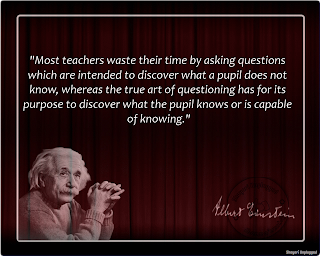On the Teaching Reading website, their article on strategies for “Asking Questions to Improve Learning” , suggests that when planning your lesson you should go ahead and come up with specific questions. By doing this, you will already have few questions brainstormed for your exams or paper assignments. A few strategies to responding effectively include: do not interrupt students’ answers, develop responses that keep students thinking, always show interest in a student’s answer even if it is incorrect, wait for students to think and formulate responses. This website also gives you twelve objectives to “Why ask ‘open’ Questions?” It gives sample questions for each scenario.
When reading the article “The Right Way to Ask Questions in the Classroom” by Ben Johnson, he states that the most important question we should be asking is "What does a teacher asking questions of a class expect the class to learn from the questioning process?" Some teachers say that the reason questions must be asked is to see if the students understand what is being taught. Teachers often ask the common question, “Does everybody understand?” This question has become useless because it is said so often, even when teachers can look at a student’s facial expression and see the confusion written all over it. Sometimes when a student doesn’t understand, they do not know what questions to ask in order to have a better understanding so they remain silent. In order to truly ask questions that will really tell a teacher if students understand or not we have to be specific. Ben goes on to talk about the fact that students who don’t know answers to questions, will often tune out the smart kids who answer all the questions all of the time. They are perfectly fine with someone else volunteering an answer and them not have to attempt an answer themselves. If a student is not called on to answer a question, they are too busy thinking, “I’m glad she didn’t call on me” to really be thinking about the answer and to learn. One simple, effective approach to this is to ask a specific question and then pause for a few seconds. This way, no student knows who is going to be called on and they should all be brainstorming for an answer.
In the video, “Asking Better Questions in the Classroom” by Joanne Chesley, she starts off by saying how a lot of times teachers notice that students are unresponsive in the classroom. We fail to realize we are getting the responses that we ask for. When we are not detailed with the question, the students are not detailed with their answers. She tells the difference between an open and close-ended question. An open-ended question lets the student think more and come up with more information. This lets the student come up with a variety of responses and allows the student to think through the situation. A close-ended question can simply be answered with a yes or no response. Our goal as teachers should be the ask as many open-ended questions as possible in order to get the students interested and thinking about what their response could be if called on to answer.
“Three Ways to Ask Better Questions in the Classroom” by Maryellen Welmer is very short and to the point. The first word of advice is to prepare questions. Maryellen states that for most of her career she spent time preparing content and not questions to use while teaching. Writing out a question in advance helps you to make sure it is clear enough for the students to understand. It helps you to plan things such as, when does the question need to be asked? This way it fits into your lessons and relates to concepts you are talking about right then. The second word of advice is to play with questions. Playing with the question in this sense is meaning to maybe leave the question unanswered for a little while. This way the students stay engaged in the topic and are continuing to think about what the answer could be. You as the teacher could write the question on the board and not discuss it until the period is over. The students could write down their ideas and share with the class their suggestions. The last word of advice is to preserve good questions; good questions can always be kept. It could also be good to write down and keep students questions that trigger the rest of the class to start thinking. It is important for teachers to ask good questions so that students can learn that questions are important and help us learn and to think critically.


This is the best review on a blog I have read to date. Your summaries are clear and concise. And I really liked your first pic, perhaps that will be you one day?
ReplyDeleteAs for your Einstein quote/pic, I was a little sad I didn't recall that one while writing my own post.
My only suggestion would be, what is a question you think is important? I don't see any of 'you' in this post. What is a question that would reflect who you are as a person? (Not that my idea was part of the assignment, simply thought it would have been nice.)
Great job!